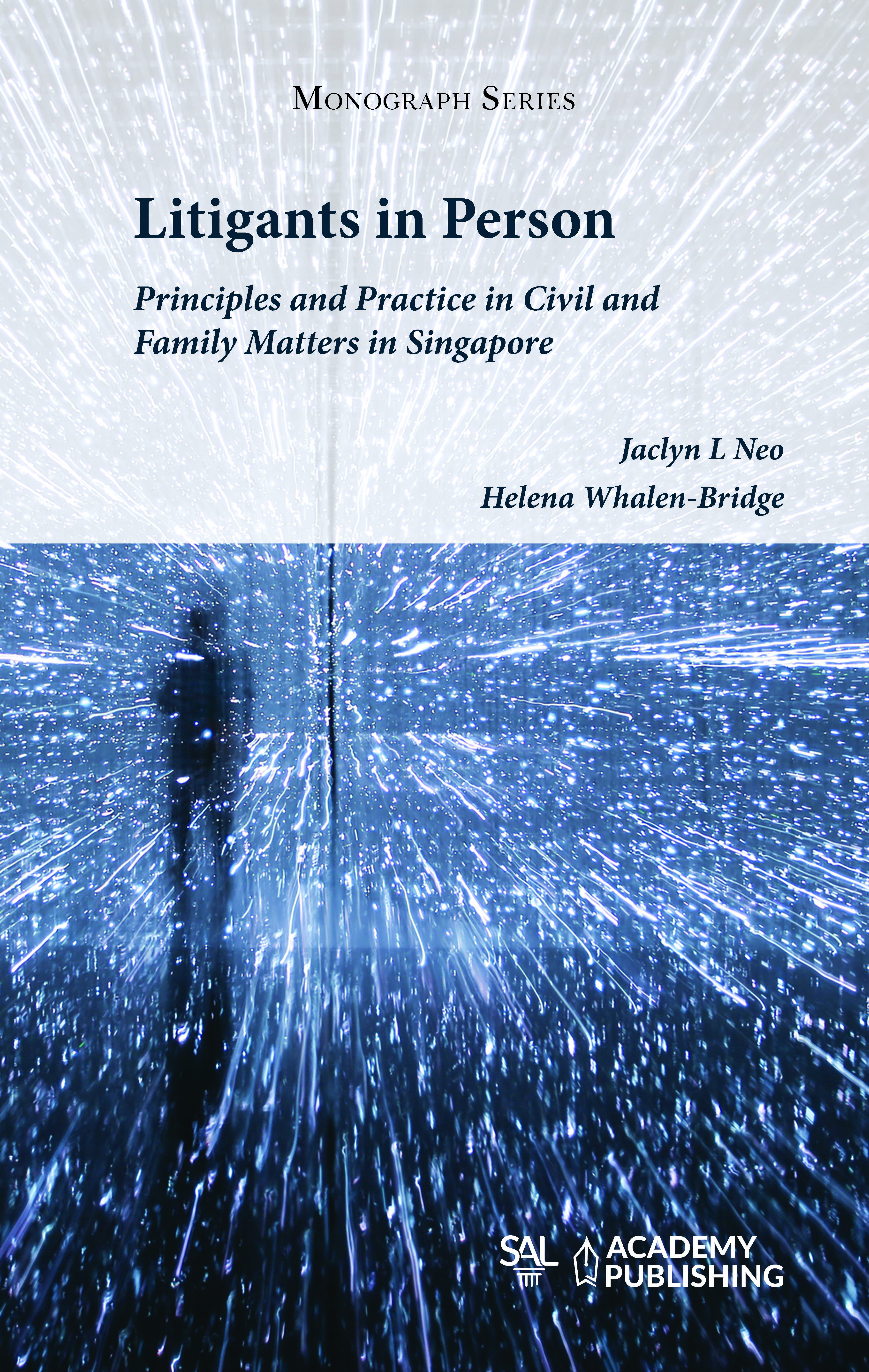This book is the first academic examination of litigants in person (“LiPs”) in the Singapore legal system. LiPs are a significant presence in Singapore’s legal system. Within our adversarial tradition of adjudication, high levels of self-representation can raise multiple distinctive access to justice issues for LiPs as well as other actors in the justice system. Focusing on civil and family law proceedings, this exploration of LiPs in the Singapore system is situated within a broader understanding of access to justice, premised upon the need to ensure practical and effective access to justice. The book employs different methodologies, including a doctrinal legal analysis, a literature review of academic writings, policy papers, and official reports, and an empirical consideration of written court judgments involving LiPs. The book also contains findings from in-depth interviews of a small group of LiPs, conducted with the Community Justice Centre’s assistance, as well as a survey of lawyers conducted with the Law Society of Singapore’s assistance. These mixed methodologies inform a tripartite framework to analyse the status, needs, and impact of self-representation in the current system. The tripartite framework focuses on the perspectives of three main constituents: the LiPs themselves, judges and court staff, and lawyers representing other parties in a proceeding.
The book identifies points of apparent disconnect between the assumed “ordinary” working of the legal system and the needs of LiPs. When litigants self-represent, there is an impact not only on the system in terms of efficiency, but also on all parties involved – the judges and the courts, the lawyers representing an opposing or other party, and the litigant himself. Within an adversarial system that presumes the existence of lawyers, any approach to manage heightened burdens when litigants self-represent must be multi-pronged, one that conceptualises the administration justice as a legal ecosystem of interdependent actors.
Contents:
|
1 |
Introduction |
|
2 |
Litigants in Person in Singapore and Other Common Law Systems |
|
3 |
Judicial Approached to Litigants in Person in Civil and Family Proceedings |
|
4 |
Experiences of Litigants in Person with the Court Process |
|
5 |
Lawyers and Litigants in Person: Inequality of Arms? |
|
6 |
Innovations to Better Serve Litigants in Person |
|
7 |
Conclusion |
Author(s)/Editor(s)/Contributor(s):
Associate Professor (Dr) Jaclyn L Neo
Jaclyn Neo is an Associate Professor and the Director of the Centre for Asian Legal Studies at the National University of Singapore (“NUS”) Faculty of Law. A graduate of the NUS Faculty of Law (LLB) and Yale Law School (LLM and JSD), she is the recipient of multiple academic scholarships, competitive research grants, and research awards. Jaclyn has published in leading journals in her field, including the International Journal of Constitutional Law (I-CON), Oxford Journal of Law and Religion, Human Rights Quarterly, and the Singapore Journal of Legal Studies. She is the editor/co-editor of Constitutional Change in Singapore: Reforming the Elected Presidency (Routledge, 2019), Constitutional Interpretation in Singapore: Theory and Practice (Routledge, 2017), Pluralist Constitutions in Southeast Asia (Hart, 2019), and Regulating Religion in Asia: Norms, Modes, and Challenges (Cambridge University Press, 2019). Jaclyn has served as a guest editor for the Singapore Academy of Law Journal, Journal of Law, Religion, and State, German Law Journal and the Journal of International and Comparative Law. Her work has been cited by the courts in Singapore and by the Supreme Court of India. She currently serves on the SAL Law Reform Committee and the Executive Committee of the ASEAN Law Association (Singapore), and is a Professorial Fellow with the AGC Academy.
Associate Professor Helena Whalen-Bridge
Helena Whalen-Bridge is an Associate Professor of Law at NUS, and an Expert with the United Nations Office on Drugs and Crime’s Education for Justice project. A recipient of multiple competitive research grants and the 2019 Teresa Godwin Phelps Award for Scholarship in Legal Communication, her research in access to justice focuses on unrepresented litigants and how access to justice is conceptualised and functions in Asia. Relevant publications include the forthcoming The Lawyer’s Role in Access to Justice: Asian and Comparative Perspectives (Cambridge University Press), and “The Conceptualisation of Pro Bono in Singapore” (2014) 9 Asian Journal of Comparative Law 97. Helena teaches Legal Ethics and Access to Justice. She received the NUS Teaching Excellence Award and is a longstanding member of the Law Faculty’s Teaching Excellence Committee. Helena is also a founding member of the Law Society of Singapore’s Project Law Help, which helps provide legal information and support to charities and social enterprises. She has been the Faculty Advisor for the Law Faculty’s student Pro Bono Group since its inception in 2005
Delivery
Book will be delivered end of January 2021.
Specification
|
Publication Type: |
Books |
|
CS Redeemable: |
Yes |
|
Date of Publication: |
Jan 2021 |
|
ISBN Code: |
|
|
Depth: |
|
|
Width: |
|
|
Height: |
|
|
Shipping to SG: |
FREE |
|
Price(SGD): |
$64.20 |
|
Weight: |
|













